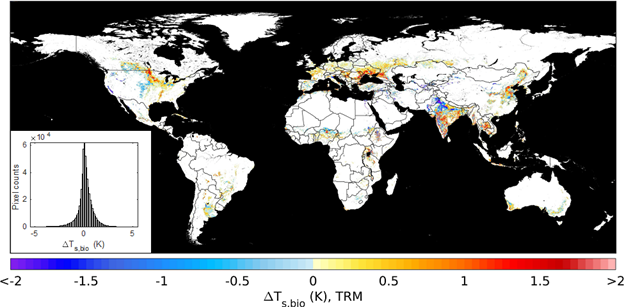
Pattern of cropland-induced biophysical contribution on annual daily mean land surface temperature change (ΔTs,bio) averaged from 2001 to 2023.
The academic journal Nature Communications published new research this month authored by Chi Chen, assistant professor and faculty member in the Rutgers University Department of Ecology, Evolution, and Natural Resources.
The paper, titled “Biophysical effects of croplands on land surface temperature,” draws on two decades of satellite data to analyze the biological and physical mechanisms by which croplands affect land surface temperatures.
Chen’s findings highlight the complex relationship between land use, vegetation, and regional climate and offer valuable insights into sustainable agriculture and land-based climate change mitigation. The research found that 60 percent of global croplands exhibit annual warming effects while 40 percent have a cooling effect, and warming is strongest in temperate dry regions surrounded by trees.
“Crops influence the absorption and redistribution of radiant energy, ultimately affecting surface temperatures,” said Chi Chen. “Our research shows that crops mainly adjust convection efficiency, a more physical rather than biological process, to regulate evapotranspiration and land surface temperature. Minimizing disturbances to this efficiency is crucial to mitigate the temperature impact of cropping activities.”

